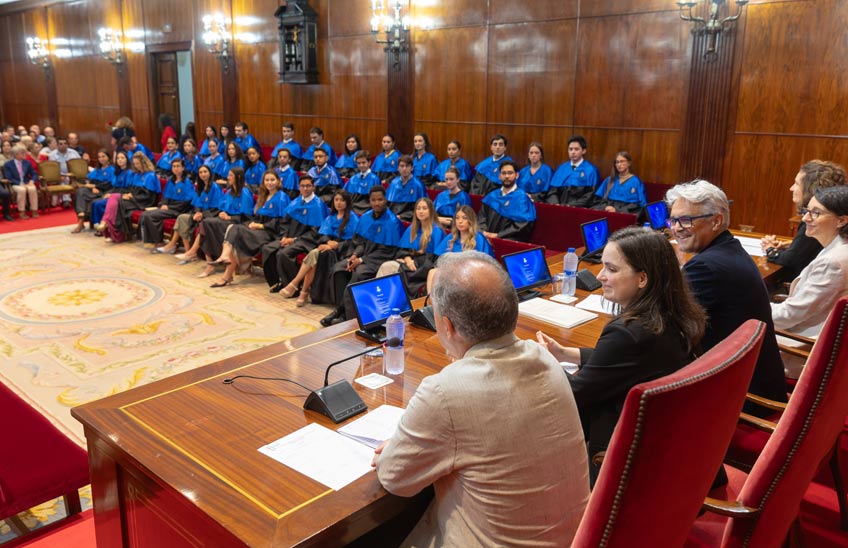New therapeutic combination improves immunotherapy efficacy in solid tumors
Researchers at the Cima University of Navarra discover that the administration of epigenetic regulators and cell death inducers prolongs survival in animal models of cancer.

FotoManuel Castells<br>/En la imagen, Vicente Fresquet, Victoria Jiménez, Rubén Pío, Ana Remírez y José A. Martínez Climent, de la División de Cáncer del Cima Universidad de Navarra
25 | 06 | 2025
Researchers at the Cima University of Navarra have developed a triple pharmacological combination that improves the efficacy of immunotherapy in different solid tumors. Its application prolongs survival in animal models of lung, colorectal, breast, pancreatic, melanoma and glioblastoma cancer.
Epigenetic therapies (aimed at modifying molecular processes that regulate gene expression) have revolutionized the treatment of hematological diseases. However, they have not demonstrated efficacy in most solid tumors. "Previousprograms of study had confirmed that their combination with cell death-inducing drugs, such as BCL-XL inhibitors, improved therapeutic outcomes in myelomas and lymphomas, but not in solid tumors. In our study, which is part of the Cancer Center Clínica Universidad de Navarra (CCUN), we have shown that this co-administration sensitizes lung tumors to immune checkpoint blockade, a novel strategy in cancer immunotherapy," says Dr. Rubén Pío. Dr. Rubén Píodirector of the Cancer Division Division of the Cima University of Navarra and scientific director of the CCUN.
In this work, the researchers have focused on the search for new therapeutic alternatives for solid tumors with few therapeutic options. "Our study demonstrates that a novel drug combination reduces tumor growth and prolongs overall survival in animal models of lung, colorectal, breast, melanoma and glioblastoma cancer, as well as in a human colon cancer model . This therapeutic combination includes the drug CM272, developed at Cima by Dr. Felipe Prósper's group , Dr. Felipe Prósper's Dr. Felipe Prósper, another of the collaborators in the research," explains Dr. José A. Martínez-Clázar, MD. Dr. José A. Martínez-Climentco-director of the study. The results have been published in the latest issue of the scientific journal Molecular Cancer.
A more effective immune system
Analysis of the tumor microenvironment by flow cytometry and single-cell RNA sequencing showed potent immune reprogramming. "Our results suggest that this pharmacological combination not only promotes tumor death, but also paves the way for the immune system to act more effectively, guiding the development of new therapies that will need to be evaluated in the clinical setting," the researchers conclude.
The work, carried out within the framework of CIBER Cancer (CIBERONC), has received public funding from the Government of Navarra, the Ministry of Science, Innovation and Universities and the Instituto de Salud Carlos III, and with the support of private institutions such as the Arnal Planelles Foundation, the Alberto Palatchi Foundation and the Spanish association Against Cancer.
reference letter bibliographic
Molecular Cancer. 2025 May 30;24(1):154. doi: 10.1186/s12943-025-02352-4.
- Co-targeting of epigenetic regulators and BCL-XL improves efficacy of immune checkpoint blockade therapy in multiple solid tumors.



